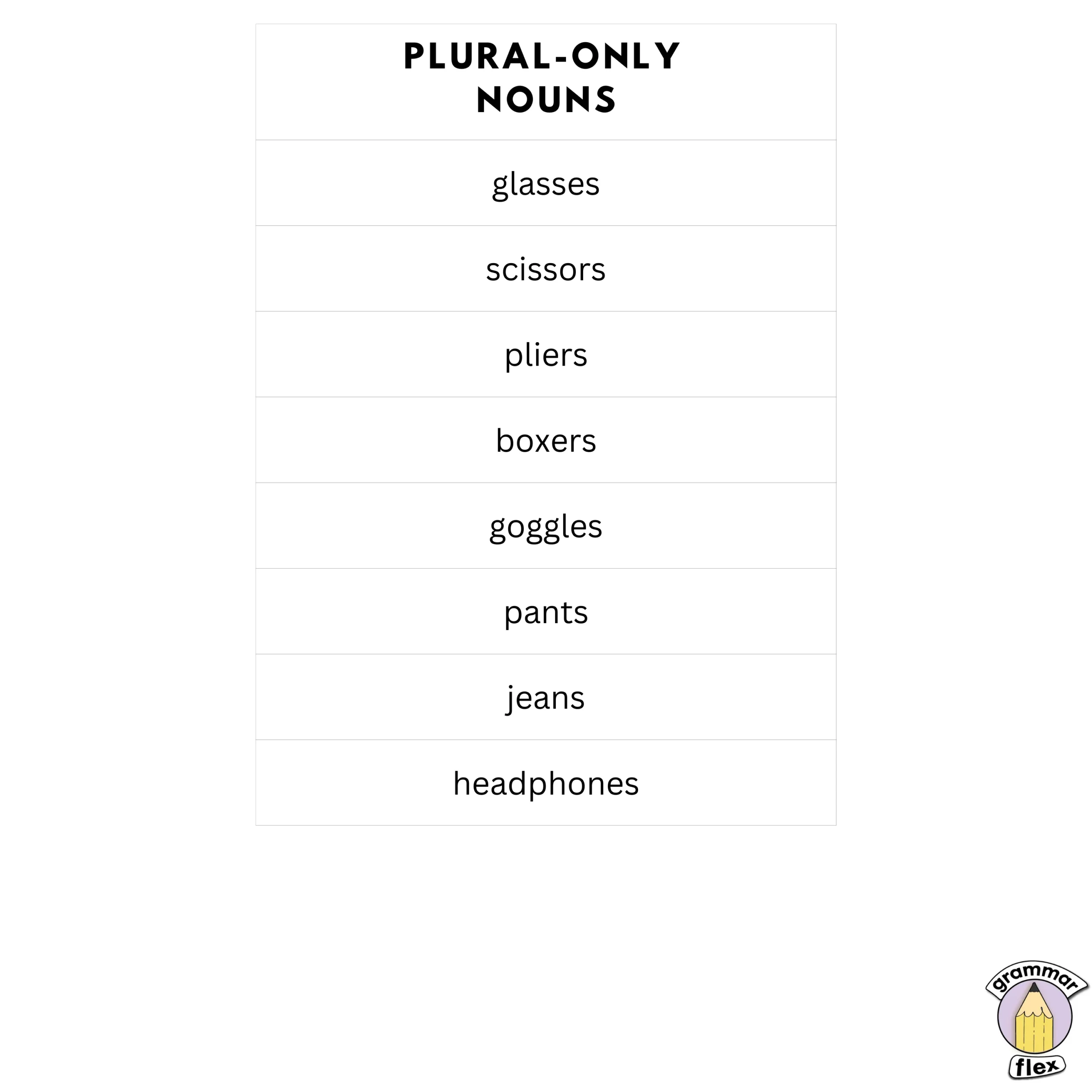What’s the plural of “glasses”?
Glasses meaning eyeglasses is plural and has no singular noun form. Glasses as in a cup, or vessel for liquids and beverages can be called a glass as a singular object. Often called ‘a pair of glasses,’ glasses is exclusively plural and made up of parts. Some nouns in English that consist of pairs, parts or pieces are only referred to in the plural case. Words and things like glasses, spectacles, pants, jeans, scissors, trousers and tongs are all only used in the plural, and have no singular noun form.
I need new frames for my glasses.
I noticed that she was wearing new glasses.
These glasses is small.
Do you have a glasses I can borrow?
Are “glasses” singular or plural?
Glasses is plural and has no singular noun form. This is because glasses are made up of parts, and so are only used in the plural noun form, i.e., glasses.
What are glasses?
The word and commonly used household object glasses, or eyewear, are defined in the dictionary as, “a pair of lenses for correcting faulty vision, in a frame that rests on the bridge of the nose and hooks behind the earsAlso called: spectacles, eyeglasses .”
Practice using the verb in different tenses with example sentences to memorize the correct forms.
Plural-only nouns
Glasses are an instrument or tool made of pieces/parts. The English language reflects this by referring to glasses (as in the eyewear) only as a plural noun. Likewise, these other nouns are exclusively-plural. In English, we call them the plural-only nouns, and just like they sound, they’re only referred to as a plural. See the list:

Examples of glasses used in context
1. I need new frames for my glasses.
2. The glasses are small in comparison with the old ones.
3. I noticed that she was wearing new glasses.
4. At that point, a tall, brown-haired man with wire-rimmed glasses came over to me, sat down, and peppered me with questions.
5. Look at the world through rose-coloured glasses.
Origin of the word glasses
From etymonline on glasses:
“Old English glæs “glass; a glass vessel,” from Proto-Germanic *glasam “glass” (source also of Old Saxon glas, Middle Dutch and Dutch glas, German Glas, Old Norse gler “glass, looking glass,” Danish glar), from PIE root”.
What’s the difference between they’re, their, and there?
Worksheet
According to the post, are “glasses” (meaning eyewear) singular or plural?
Based on the blog post, why are “glasses” (eyewear) typically considered plural-only?
What is the singular noun form of “glasses” when referring to eyewear, according to the post?
Which of the following nouns is listed in the post as being exclusively plural, like “glasses” (eyewear)?
According to the post, which of these items is NOT typically referred to only in the plural form?
Complete the sentence with the correct verb based on the post’s grammar rules: “My new glasses _______ very comfortable.”
Complete the sentence using the correct form of the word referring to eyewear: “She reached for her _______ on the nightstand.”
Complete the sentence referring to a drinking vessel: “He filled the _______ with milk.”
Complete the sentence using a plural-only noun listed in the post: “I need to sharpen my _______.”
Complete the sentence using a plural-only noun listed in the post: “My favorite pair of _______ are blue.”
Frequently Asked Questions
Are glasses singular or plural?
+
Can I say “a glass” for eyewear?
+
Why is glasses always plural?
+
What are examples of glasses usage?
+
What words are always plural like glasses?
+
Yash, D. "Are Glasses Singular or Plural?." Grammarflex, Jun 17, 2025, https://www.grammarflex.com/whats-the-plural-of-glasses/.
Sources
-
Definition of glasses.











